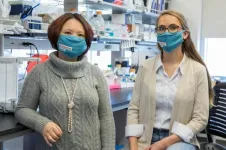Researchers explore relationship between maternal microbiota and neonatal antibody response
2021-03-03
(Press-News.org) A healthy system of gut bacteria, or microbiota, is crucial to health: Gut bacteria not only aid with digestion, but also play an important role in the body's immune response. Infants, however, are not born with full-fledged gut microbiota, which makes it difficult for them to fight off intestinal infections.
Although little is known about how the immune system develops during infancy, new research from the Virginia-Maryland College of Veterinary Medicine's Department of Biomedical Sciences and Pathobiology sheds significant new light on the subject.
A research team from principal investigator Xin Luo's lab used rodent subjects to show a causal relationship between neonatal antibody production and the mother's microbiota. The team's paper, "Regulation of Neonatal IgA Production by the Maternal Microbiota," was recently published in Proceedings of the National Academy of Sciences (PNAS), the official journal of the National Academy of Sciences.
"Our study identifies the maternal microbiota -- harmless bacteria living in mom's milk, for example -- as a source of education for the infant's antibody response. In particular, we have found that the most abundant antibody in the human body that protects us from infections, IgA, can be educated by a specific bacterium in mom's milk, Lactobacillus reuteri, which is also a commonly used probiotic," said Luo, associate professor of immunology in the Department of Biomedical Sciences and Pathobiology.
Studies of IgA production typically focus on adult subjects, without addressing the effects of mothers' microbiota on the development of the immune response. Conversely, this study examined neonatal mice nursing from dams with different microbiotas and measured the changes in the neonatal mice's IgA production.
Using germ-free mice from the veterinary college's gnotobiotic rodent facility, the researchers determined that L. reuteri is one of the neonatal IgA-inducing bacteria in the maternal microbiota. In turn, raising an infant's IgA production through L. reuteri might result in a more robust immune response to pathogens. Particularly because a strain of L. reuteri isolated from human breast milk was used for the study, the findings have the potential to be translated to human medicine.
"It will be interesting to see if human maternal microbiota have similar mechanisms with mice in educating neonatal immune response, especially the mucosal immunity," said first author Qinghui Mu (Ph.D. '18), a postdoctoral fellow at Stanford University's School of Medicine and former doctoral student in Luo's lab. "IgA is vital for the prevention of enteric pathogens, and IgA inducible bacteria may be supplemented as probiotics for preventing an infant's enteric infections."
The next step is to determine the effects that these newly produced antibodies have on the neonatal immune response. "Early perturbation of microbiota is linked to autoimmune diseases. It's not completely clear whether the observed immunological changes could affect autoimmune development, but if we can identify microbes that enhance early defenses without setting off self-reactivity, then we could potentially use them to protect infants from infections," said first author Brianna Swartwout, a Ph.D. candidate in the Translational Biology, Medicine, and Health Graduate Program and a member of Luo's lab.
The goal of the research, Luo said, is to better understand the benefits of microbes in order to recommend solutions, such as probiotics, that could strengthen the neonatal immune system. These efforts could lead to new strategies in medicine -- and healthier babies.
INFORMATION:
[Attachments] See images for this press release:

ELSE PRESS RELEASES FROM THIS DATE:
2021-03-03
DURHAM, N.H.-- In business, as in life, it is important to make a good first impression and according to research at the University of New Hampshire a positive initial trust interaction can be helpful in building a lasting trust relationship. Researchers found that trusting a person early on can have benefits over the life of the relationship, even after a violation of that trust.
"It's not just an old adage, first impressions really do matter especially when it comes to trust," said Rachel Campagna, assistant professor of management. "During an initial interaction, one of the most important and immediate factors people consider about another person is trustworthiness. It can impact their willingness to accept risk and vulnerability ...
2021-03-03
Although the use of pesticides in agriculture is increasing, some farms have transitioned to organic practices and avoid applying them. But it's uncertain whether chemicals applied to land decades ago can continue to influence the soil's health after switching to organic management. Now, researchers reporting in ACS' Environmental Science & Technology have identified pesticide residues at 100 Swiss farms, including all the organic fields studied, with beneficial soil microbes' abundance negatively impacted by their occurrence.
Fungicides, herbicides and insecticides protect crops by repelling or destroying organisms that harm the plants. In contrast, organic agriculture management strategies avoid adding ...
2021-03-03
In earlier days of the COVID-19 pandemic, before diagnostic testing was widely available, it was difficult for public health officials to keep track of the infection's spread, or predict where outbreaks were likely to occur. Attempts to get ahead of the virus are still complicated by the fact that people can be infected and spread the virus even without experiencing any symptoms themselves.
When studies emerged showing that a person testing positive for COVID-19 -- whether or not they were symptomatic -- shed the virus in their stool, "the sewer seemed like the 'happening' place to look for it," said Smruthi Karthikeyan, PhD, an environmental engineer and postdoctoral researcher at University of California ...
2021-03-03
Healthy human bodies are good at regulating: Our temperatures remain around 98.6 degrees Fahrenheit, no matter how hot or cold the temperature around us. The sugar levels in our blood remain fairly constant, even when we down a glass of juice. We keep the right amount of calcium in our bones and out of the rest of our bodies.
We couldn't survive without that regulation, called homeostasis. And when the systems break down, the results can cause illness or, sometimes, death.
In presentations at the American Association for the Advancement of Science's annual meeting, researchers argued that mathematics can help explain and predict those breakdowns, potentially offering new ways of treating the systems to prevent or fix them when things go wrong. The meeting ...
2021-03-03
Imagine seeing the world in muted shades -- gray sky, gray grass. Some people with color blindness see everything this way, though most can't see specific colors. Tinted glasses can help, but they can't be used to correct blurry vision. And dyed contact lenses currently in development for the condition are potentially harmful and unstable. Now, in ACS Nano, researchers report infusing contact lenses with gold nanoparticles to create a safer way to see colors.
Some daily activities, such as determining if a banana is ripe, selecting matching clothes or stopping at a red light, can be difficult for those ...
2021-03-03
Land stores vast amounts of carbon, but a new study led by Cranfield University's Dr Alice Johnston suggests that how much of this carbon enters the atmosphere as temperatures rise depends on how far that land sits from the equator.
Ecosystems on land are made up of plants, soils, animals, and microbes - all growing, reproducing, dying, and breathing in a common currency; carbon. And how much of that carbon is breathed out (also known as ecosystem respiration) compared to how much is stored (through primary production) has impacts for climate change. ...
2021-03-03
Using the model organism Caenorhabditis elegans, researchers at the University of Cologne have developed an 'aging clock' that reads the biological age of an organism directly from its gene expression, the transcriptome. Bioinformatician David Meyer and geneticist Professor Dr Björn Schumacher, director of the Institute for Genome Stability in Aging and Disease at the CECAD Cluster of Excellence in Aging Research and the Center for Molecular Medicine Cologne (CMMC), describe their so-called BiT age (binarized transcriptomic aging clock) in the article 'BiT age: A transcriptome based aging clock near the theoretical limit of accuracy' in Aging Cell.
We are all familiar ...
2021-03-03
Alexandria, Va., USA -- The clinical picture of COVID-19 in various target organs has been extensively studied and described, but relatively little is known about the characteristics of oral cavity involvement. The study "Frequent and Persistent Salivary Gland Ectasia and Oral Disease After COVID-19" published in the Journal of Dental Research (JDR), investigated the presence and prevalence of oral manifestations in COVID-19 survivors.
Researchers at the Università Vita Salute San Raffaele, Milan, Italy, profiled the oral involvement in 122 COVID-19 survivors, hospitalized and followed up at a single referral visit after a median 104 days from ...
2021-03-03
Systemic fungal infections are much rarer than other illnesses, but they are potentially deadly, with limited options for treatment. In fact, fungi are becoming increasingly resistant to the few drugs that are available, and infections are growing more common. A cover story in Chemical & Engineering News, the weekly newsmagazine of the American Chemical Society, details how scientists are working to improve our antifungal arsenal.
At present, there are only four types of antifungal drugs approved by the U.S. Food and Drug Administration (FDA), and some infections are resistant to those drugs, making surgery ...
2021-03-03
Fields are covered with dandelions in spring, a very common plant with yellow gold flowers and toothed leaves. When they wither, the flowers turn into fluffy white seed heads that, like tiny parachutes, are scattered around by the wind. Taraxacum officinale, that is its scientific name, inspired legends and poems and has been used for centuries as a natural remedy for many ailments.
Now, thanks to a study conducted at the University of Trento, dandelions will inspire new engineered materials. The air trapping capacity of dandelion clocks submerged in water has been measured in the lab for the first time. The discovery paves the way for the development of new and advanced ...
LAST 30 PRESS RELEASES:
[Press-News.org] Researchers explore relationship between maternal microbiota and neonatal antibody response


